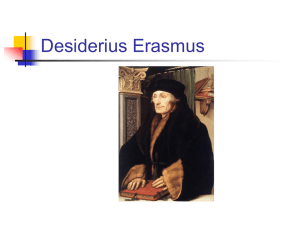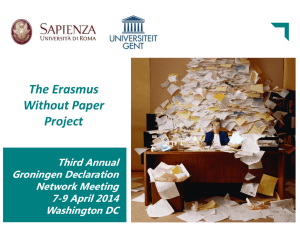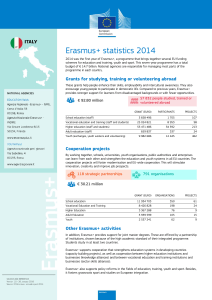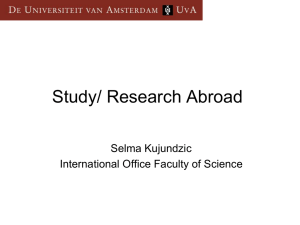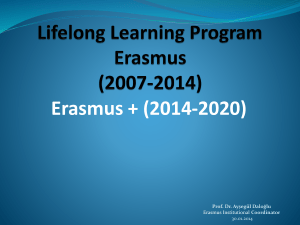Erasmus
advertisement
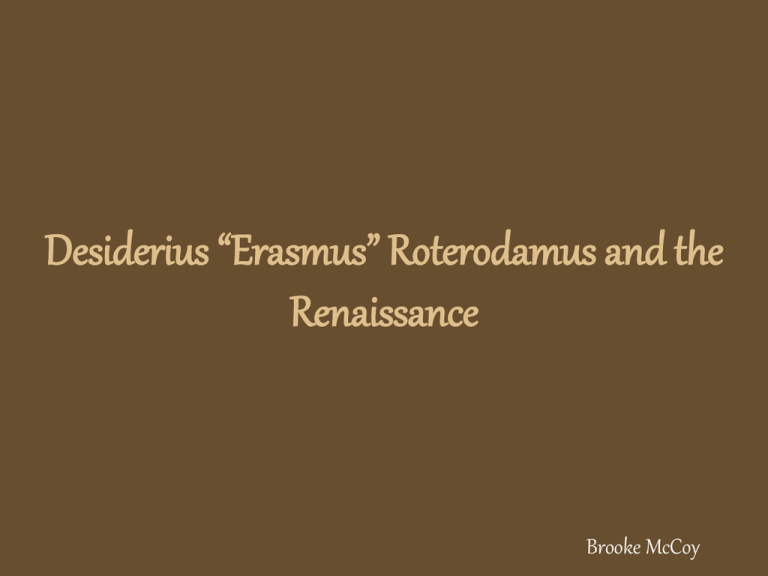
Desiderius “Erasmus” Roterodamus and the Renaissance Brooke McCoy Renaissance significance on society The renaissance gave way to enlightenment and rebirth. This period of time allowed a break off from the past medieval era. To scholars and philosophers, it was largely a time of the revival of classical learning and wisdom after a long period of cultural decline. With an increased interest in class Greek and Roman culture art, music, and philosophy experienced the most noticeable changes. The invention of the printing press led to books being more widely available, which encouraged an increase in literacy. Politically, the period of the Renaissance saw a growth in the power of individual monarchs and rulers. In Italy, the various princes and dukes who ruled the many states into which Italy was divided were very powerful. Machiavelli's book The Prince gave counsel on how to be a glorious and powerful ruler. Over all, the Renaissance led to a society with a greater focus on the man’s potential. Erasmus Erasmus was born at Gouda, a city in the Netherlands, on October 27, 1466. Originally, he was called Gerrit Gerritszoon (Dutch for Gerard Gerardson). Erasmus later changed his name to Desiderius, which means “desired one” in Latin. Both of his parents died of the plague when Erasmus was about fifteen. His guardians pressured him into attending the monastery at Emmaus. Erasmus hated his time in the church and wrote about it as one of the worst periods of his life. Erasmus Erasmus was one of the greatest scholars of the renaissance time. He was a Dutch writer, scholar and humanist. Erasmus adopted a pure Latin style commonly shared by many Renaissance humanist writers. He was a prolific writer and exerted such great influence during his time that he was called "The Prince of the Humanists.“ As a Christian Humanist his goal was to promote basic Christian values. Erasmus claimed that men are ‘made human’ through education – a claim who’s echoes we find from as early as Aristotle and into the enlightenment, whose earliest traces are sourced from Descartes’ Discourse on Method, published a full century after Erasmus’ death. Erasmus Erasmus was a potent factor in the educational movement of his time. Beginning in 1499, Erasmus moved from city to city working as a tutor and lecturer, constantly searching out ancient manuscripts and writing. He translated and edited many classical and early Christian works and also published a critical edition of the Greek text of the New Testament which drew on newly available sources and was immensely influential. Erasmus The Dutch humanist contributed to the Renaissance by revising ancient works and translating them into Greek and Latin such as the Bible. Erasmus also contributed to the Reformation by calling for reform in the Church through his various satirical works. He contended with the reformer Martin Luther (14831546), emphasizing the importance of free will in human actions against Luther’s belief in the absolute bondage of the will to sin. Erasmus died in Basel in Switzerland on 12 July 1536. Humanism Quotes by Erasmus “I consider as lovers of books not those who keep their books hidden in their store-chests and never handle them, but those who, by nightly as well as daily use thumb them, batter them, wear them out, who fill out all the margins with annotations of many kinds, and who prefer the marks of a fault they have erased to a neat copy full of faults.” “There are some people who live in a dream world, and there are some who face reality; and then there are those who turn one into the other.” “When I get a little money, I buy books; and if any is left, I buy food and clothes.” “Great abundance of riches cannot be gathered and kept by any man without sin.” “A good portion of speaking will consist in knowing how to lie.” “He who allows oppression shares the crime.” “Give light, and the darkness will disappear of itself.” “In the country of the blind, the one eyed man is king.” Major Works of Erasmus • • • • • • The Colloquies vol. 1 The Colloquies vol. 2 The Complaint of Peace In Praise of Folly A Discussion of Free Will The Manual of a Christian Knight • The Works of Vicesimus Knox, vol. 5 Praise of Folly Praise of Folly, written to amuse his friend Sir Thomas More, is Erasmus’s best-known work. Its dazzling mixture of fantasy and satire is narrated by a personification of Folly, dressed as a jester, who celebrates youth, pleasure, drunkenness and sexual desire, and goes on to lambast human pretensions, foibles and frailties, to mock theologians and monks and to praise the ‘folly’ of simple Christian piety. Erasmus’s wit, wordplay and wisdom made the book an instant success, but it also attracted what may have been sales-boosting criticism. Praise of Folly Throughout the thirteenth, fourteenth, and fifteenth centuries the Church encountered much criticism from reformers. Thus, the famous humanist, Erasmus, wrote his Praise of Folly to expose the secular ambitions of bishops and monks, the foolish speculations of theologians, and the excessive reliance which common people had on pilgrimages, festivals, relics, and other aids to devotion. Praise of Folly A satire employed to attack superstition and the abuse of doctrine within the Catholic Church. Erasmus used the personification of Folly to satirize different people, groups, and the Catholic Church. Folly (the essay's central character) praises herself endlessly, arguing that life would be dull and distasteful without her. Of earthly existence, Folly pompously states, "you'll find nothing frolic or fortunate that it owes not to me." Folly speaks directly of Christianity, regarding its religious authority and practices. A Discussion of Free Will Erasmus' earlier, more positive evaluation of human nature was the basis for his discussion of a topic of major philosophical interest, the freedom of the human will, which became the central issue in a conflict that began in September 1524 when he published A Discussion of Free Will, in which he directly attacked a central doctrine of Martin Luther's theology, his assertion in his defense against the papal bull of excommunication that contrary to the opinion of scholastic theologians, the human will after Adam's sin was so disordered that it was unfree, unable through its own power to make even the slightest positive response to God's saving grace, unable to do anything that was not a sin. Colloquies Erasmus criticized the monks and church leaders for taking vows of poverty and then not honoring them. Colloquia, better known as Colloquies, gained him even more hostility from the Church. In this work, Erasmus continued to assault erroneous Church practices. Much concerned with religious humanism, Erasmus deftly wielded his gift of writing as an instrument of peace. He was renowned for his pacifist views, which he poignantly enumerates in Against War. He felt that war was senseless since it only caused destruction and death. Those who engaged in war he rebuked as having no greater morality than beasts. Although he scorned human warfare, he excused killing in the animal kingdom. He believed God equipped mankind with the capacity for love, empathy, and kindness: virtues which were not displayed during times of war. The Spirit of The Renaissance The Renaissance was a period of great change. One of the greatest scholars of this time was Desiderius Erasmus. He contributed to the Renaissance by revising ancient works and translating them into Greek and Latin. During his lifetime, Erasmus also contributed to the Reformation by calling for reform in the Church through his various satirical works such as Praise of Folly. Erasmus was the dominant figure of the early humanist movement. As the foremost of the German humanists, he worked constantly and effectually for the spread of the new learning, which imparted to the education of the Renaissance period, its content and spirit. Works Cited • • • • • • • • • • http://www.egs.edu/library/desiderius-erasmus/biography/ http://www.biography.com/people/erasmus-21291705 http://www.mrrena.com/misc/erasmus.php http://www.lordsandladies.org/erasmus.htm http://www.rsm.nl/about-rsm/facts-figures/desiderius-erasmus/ http://www.newadvent.org/cathen/05510b.htm http://plato.stanford.edu/entries/erasmus/ http://www.notablebiographies.com/Du-Fi/Erasmus-Desiderius.html http://ahistoryofthepresentananthology.blogspot.com/2013/02/placeholder.html http://library.usask.ca/archives/images/publishedworks/rarebooks_onlinefeatures/illustrating_moveable_type/erasmi_roterodami.jpg
